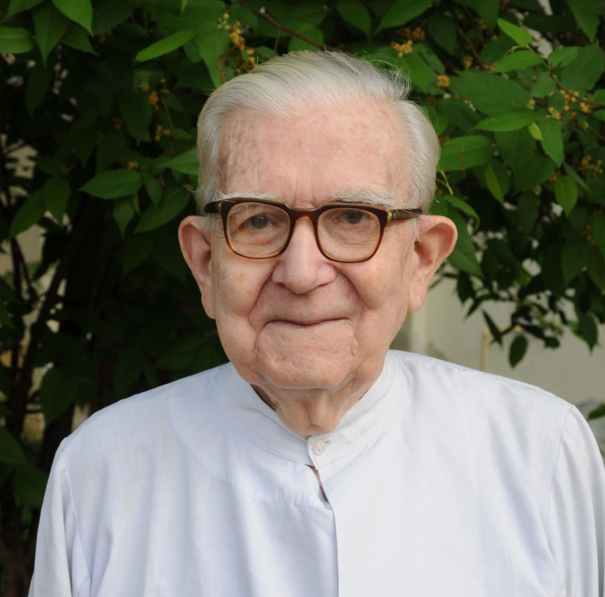
Paul de la Gueriviere
Paul de la Gueriviere, French by birth but an Indian by choice, was an inspirer as person and ideolouge. He was an unassuming personality, shy, soft-spoken and nervous and yet powerful in thoughts and ideas. His thoughts were shaped by the spirit of the All India Catholic University Students Federation (AICUF) were also shaped by the socio-economic and historical processes. That is precisely why he was preoccupied with the issue related to labour, economic liberalization, globalization, eviction of farmers, development-induced displacement, migration and other socio-cultural and political problems impacting the lives of the marginalised communities, primarly the tribals, dalits, women, children, youth, labourers, migrants and so on.
He was always preoccupied with how social transformation could be brought about to make a world that was just, humane and liberative. he understood the structural problems ofIndia and was convinced that a viable solution was possible only by structural changes. Dr Ambrose Pinto calls him “an authentic Jesuit, a perfect gentleman and an academic activist”. Paul G was a man with youthful spirit and a vision for the creation of an egalitarian and just society. He was an ideologue, who was clear about the way in which Indian Social Institute could intervene in the processes of larger society. In spite of all odds he was convinced that another world is possible. He was a revolutionary who wanted the institute to break its structures and move into the larger society. Some of his major concerns were the Hindutva ideology, neo-liberalism and rights of the marginalised communities. While he considered Hindutva as a form of Indian fascism, he held neo-liberalism responsible for increasing suicides of farmers, collapse of agriculture in the country, commercialization of education, increasing prices, land alienation of the poor, and so on. He was against nuclearisation and militarisation of India, which he believed would make country more insecure than secure. Paul G stood never compromised on the core values, options and orientations of the institute. Behind the simplicity, serenity and frailty of Paul G was an alert critical and powerful mind that went into the root of the problem. Throughout his life he tried to make people aware of the unjust structures in society and prompted people to take a stand on behalf of the poor. Though a low-key man, he inspired all those who came to him for guidance. The best way to pay homage to this great man will be to keep his legacy ever alive.
Fr. Paul de la Gueriviere, S.J., affectionately called ‘paul g’, who inspired many young and old by his consistent commitment to the cause of the marginalised breathed his last at 8:30 p.m. on 21 December 2011. He was laid to rest the next day at 5:00 p.m. at Beschi lllam at Dindigul Tamilnadu. Paul G’s death is an irreparable loss not only to South Asia but to the whole Society and it will not be easy to fill the vacuum left by him. He was born on 30 August 1920 in France. A French by birth but an Indian by choice, Paul G. visited his home country only once during his 65 years in India. He was a true friend, guide and a philosopher, on whom one could count. He was an inspiration to one and all. A self-taught person, Paul G. was a voracious reader and always encouraged rigor in research in order to bring a ray of hope in the lives of millions of less privileged of our society. His social analysis sessions were well appreciated by his students.
A Madurai Jesuit, Paul G. spent the best part of his life in both the Indian Social Institutes (ISIs) in Bangalore and Delhi, where he also played the role of a catalyst of social change and new ventures to read the signs of the times and make structural adjustments to enable effective civil society interventions for a better world. He was instrumental in holding on to the original vision and mission of ISI Delhi, motivating the younger generations to go beyond the ordinary and the immediate. He also enabled people to critique the anti-people policies and programmes and respond to the hopes and struggles of the common masses. Paul G was the true conscience of the Indian Social Institute. In his death we have lost a saint, scholar, gentleman, visionary and a missionary. His spirit, however, still lives amidst us inspiring and challenging us to continue his legacy of rigor and apostolic aggressively in whatever we are engaged.
